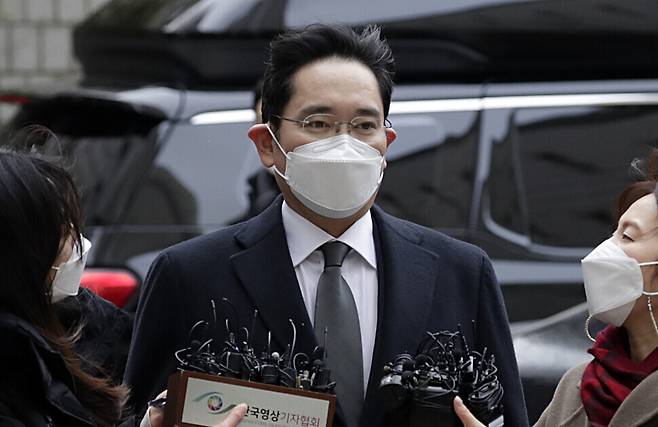Lee Jae-yong's sentence punishes illegal familial succession among chaebol firms
이 글자크기로 변경됩니다.
(예시) 가장 빠른 뉴스가 있고 다양한 정보, 쌍방향 소통이 숨쉬는 다음뉴스를 만나보세요. 다음뉴스는 국내외 주요이슈와 실시간 속보, 문화생활 및 다양한 분야의 뉴스를 입체적으로 전달하고 있습니다.

Samsung Vice Chairman Lee Jae-yong was taken into custody after being sentenced by a South Korean high court to two years and six months in prison. Lee had been charged with bribing former President Park Geun-hye to help him inherit control of the Samsung Group.
The verdict shows that the “three-five rule” — the practice of giving business leaders a three-year sentence suspended for five years, so that they don’t actually serve any time behind bars — no longer applies, even when the head of the Samsung Group is on trial.
Concerns had been raised in the legal community that the court was trying to go easy on Lee, given its unusual recommendation that Samsung set up a legal compliance oversight committee. But in the end, the court sided with the prosecution, led by Special Prosecutor Park Young-soo.
Lee has already served about a year in prison, from the time he was taken into custody in February 2017 until he was released by a high court that suspended his sentence. This means he has about a year and six months left in his sentence, presuming the sentence isn’t reversed on appeal.
On Jan. 18, Chung Jun-yeong, head of the 1st criminal division at the Seoul High Court, found Lee guilty on charges of embezzlement and bribery to the amount of 8.6 billion won (US$7.8 million).
The court said that Lee “aggressively bribed” Park and “implicitly requested that Park use her presidential authority to aid his succession of the Samsung Group.”
The high court accepted the bribery amount enumerated in the en banc ruling by the Supreme Court that overruled an earlier high court decision. The high court also convicted Lee of forging a horse purchase contract (to conceal criminal proceeds) and of committing perjury during a hearing at the National Assembly.
In addition, the court mentioned the legal compliance oversight committee. Earlier, the court had indicated it would factor the committee’s activity into Lee’s sentence.
“It does not appear that [the oversight committee] is preemptively monitoring or preventing new types of risk that could occur in the future. I have reached the conclusion that it would not be appropriate to take [the committee] into account in weighing [Lee’s] sentence,” the court said.
“While this case is part of the influence-peddling scandal, it can also be seen as part of a string of bribery and embezzlement crimes involving top Samsung executives, crimes that have occurred repeatedly whenever political power changes hands. While [the oversight committee] hasn’t met the efficacy criteria, I hope that, with time, it will be regarded as a major milestone in the history of Korean corporations, and as a jumping-off point for making great strides toward corporate management that is ethical and compliant with the law.”
Jang Choong-gi, the former director of Samsung’s Future Strategy Office, and Choi Gee-sung, the former deputy director of that office, were also taken into custody. Jang and Choi had both been indicted as Lee’s accomplices, and both were sentenced to two years and six months in prison.
Park Sang-jin, former president of Samsung Electronics, and Hwang Sung-soo, a former senior executive at the company, were also both given prison sentences of two years and six months, with those sentences suspended for four years. Park and Hwang had contacted Choi Seo-won (originally named Choi Soon-sil) in order to financially support the equestrian activity of Choi’s daughter.
After the sentence was announced, Lee Jae-yong looked up at the ceiling in silence and apparent bewilderment. The court gave the defendants an opportunity to speak, but Lee only nodded his head and said, “All right,” letting the word trail off.
“The essence of this case is that a business’s freedom and property rights were infringed by Park Geun-hye’s abuse of her presidential powers. When that’s taken into consideration, the court’s decision is unfortunate,” Lee’s attorneys said.
Lee’s legal team will decide whether to appeal the case to the Supreme Court after reviewing the ruling.
By Joh Yun-yeong and Jang Ye-ji, staff reporters
Please direct comments or questions to [english@hani.co.kr]
Copyright © 한겨레신문사 All Rights Reserved. 무단 전재, 재배포, AI 학습 및 활용 금지
- [포토] “커피 한잔” 부탁한 노숙인에게 점퍼∙장갑까지 건넨 시민
- 안철수, 국민의힘에 개방형 ‘원샷 경선’ 공개 제안
- 전광훈 “전라도 개발 다 우파가 해”…“김대중, 노무현, 문재인 버려야”
- 세월호 특수단, 황교안 ‘수사 외압’ 무혐의 결론
- 회사 차려 댓글 조작…경쟁 강사 비방한 ‘1타 강사’ 박광일씨 구속
- 서울시장 ‘안-오-나’ 출마…홍준표, 왜 셋 모두를 응원하나
- “윤석열, 공수처 1호인가” 질문에 김진욱 “정치적 고려 않겠다”
- 민주당 “임대료뿐 아니라 은행 이자도 제한해야”
- ‘베낀 소설’로 5개 문학상 휩쓴 손씨, ‘복붙 보고서’로 특허청장상 받았다
- ‘백두산 호랑이’ 또 로드킬…개체 90% 서식지에서